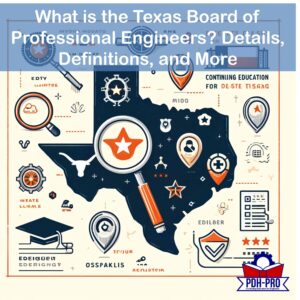Texas Board of Professional Engineers | Who They Are and What They Do
From the oil fields of west Texas to the space program in Houston, engineers weave the fabric of Texas.
They design and build the roads that connect us, the big skyscrapers we work in, and the electrical plants that power it all.
Since 1937, Texas engineers have had to prove their qualifications for licensing by what is now called the Texas Board of Professional Engineers and Land Surveyors. The agency lays out the rules and regulations for the acceptable practice of engineering.
You don’t have to get a license to work as an engineer, but the benefits include a wider range of career possibilities and higher salaries. If you want to call yourself a professional engineer in Texas, you have to work through the requirements of the TBPELS to get licensed and continue your training for renewal.
Let’s take a look at this agency that will have a profound impact on your engineering career.
About the Texas Board of Professional Engineers
So just what is the Texas Board of Professional Engineers? It’s a state agency charged with licensing engineers and land surveyors who want to work in Texas. It has a variety of roles with the main goal of protecting the public from shoddy engineering work by enforcing the Texas Engineering Practice Act.
More than 62,000 licensed engineers fall under the auspices of the TBPELS, working across 27 engineering disciplines.
History
In March 1937, almost 300 people died in New London, TX, in a school explosion caused by a faulty gas connection. The belief that the fault lay with poor engineering led to legislation – the Texas Engineering Practice Act – creating a licensing board.
The idea was to help the public determine who was qualified to practice engineering. The board took on the task of licensing anyone qualified for the work and regulating the field to ensure proper practice and ethics.
In 2019, the licensing boards for Texas professional engineers and land surveying merged to create the Texas Board of Professional Engineers and Land Surveyors.
Organization
The TBPLES has a nine-member board appointed by the governor with members serving six-year overlapping terms. Six members are professional engineers, while three represent the general public.
The board works through seven committees, specifically:
- Enforcement
- General Issues
- Licensing
- Legislative Issues
- Policy Advisory
- Nominating
- Surveying Advisory
There are also advisory members and a general counsel designated to serve the board.
Role of the Agency
The mission of the TBPLES is to protect the public by regulating the practice of professional engineering. The board creates and enforces the rules and regulations for the ethical and acceptable practice of the profession.
The key jobs of the agency are to keep a roster of all licensed engineers, provide for continuing education, and ensure the professional standards of those with licenses. As a result, most of the interaction with the board revolves around licensing and enforcement.
Licensing
Anyone wanting to be licensed as a professional engineer in Texas has to meet qualifications in three areas – education, exams, and experience.
Texas engineer educational requirements involve having various degrees or degree combinations. Any of these must have at least eight hours of math beyond trigonometry and 20 hours of engineering sciences.
If you meet the education standards, you can sit for the exams. The first is an open-book ethics exam on the engineering act you submit with your application.
The other two exams focus on specific disciplines. They cover the Fundamentals of Engineering and the Principles and Practice of Engineering. You must pass or qualify for waivers for a license.
Experience standards are either four years of active practice if you have an accredited engineering degree or eight years if non-accredited. The work must demonstrate the clear use of engineering skills in one dominant discipline and involve either design or analysis work.
Applications are considered on a case-by-case basis as there are multiple possible combinations for meeting the requirements.
Continuing Education
Once you hold a license, you are required to complete 15 hours of continuing education each year to maintain your active status. At least one hour of Texas continuing education for engineers has to fall in the category of ethics. The goal is to keep you up to speed on new technologies and developments in the field.
You can get CEP credits by taking online courses, attending conferences and seminars, participating in live webinars, or completing self-directed activities. Proof of participation should be kept for three years in case the board chooses you for an audit. This could be a log of activity or completion certificates.
Disciplinary Proceedings
The board oversees more than 750 enforcement cases per year, applying sanctions and fees as set forth in the rules. The complaints can be filed by the general public against firms or individuals.
These disciplinary hearings are held quarterly with the results posted publicly. Examples might be reprimands for practicing without a license because you failed to renew in time or a two-year suspension for stamping someone else’s work as your own.
Most violations end up with some combination of the following penalties:
- Cease and desist order
- Reprimand, Formal reprimand
- Fine (administrative penalty)
- Suspension
The board can discipline licensed engineers for violations committed in other states as well.
Working Under the TBPLES
The Texas Board of Professional Engineers holds a wide-reaching sway over the life of professional engineers in the state. It’s important to understand its role if you have plans to get licensed as a professional engineer and maintain your status.
Once you have your license, keeping up with the continuing education requirements becomes a career-long task. Our Texas Engineering Package is designed to give you a simple and convenient way to meet the standards for renewal. Contact us for more information on our courses so you can focus on doing the work you love rather than CE credits.
